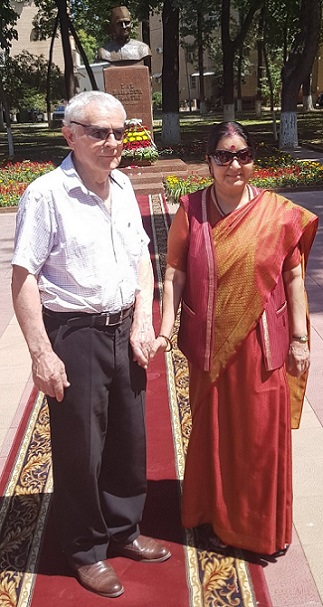Yakov Iosifovich Shapiro, the renowned sculptor of Uzbekistan who sculpted the much-famous statue and the bronze bust of former India Prime Minister Lal Bahadur Shastri in Tashkent, has died at the age of 84. The statue and the bust, erected in Shastri's memory adjacent to Lal Bahadur Shastri street, has for past many decades been one of the major attractions for the visiting Indians.
Commissioned by the USSR government, the bust was unveiled in 1976, ten years after India's second PM had died in the in the Uzbekistan capital after signing the Tashkent Declaration that formally ended a war between India and Pakistan. Shapiro was also awarded by the then Prime Minister of the Soviet Union, Alexei Nikolayevich Kosygin for it.
International multimedia project, Uzbekistan's Cultural Heritage in World Collections reported how Yakov Shapiro made art panels for five metro stations, as well as monuments to Maxim Gorky, Shota Rustaveli, Hamid Alimdzhan, Sharaf Rashidov, Lal Bahadur Shastri, Batyr Zakirov and national hero Khoja Nasreddin Afandi in Bukhara.

His works have been exhibited in Uzbekistan, Russia, the United States, France, Italy, Israel, Japan and other countries. The artist also worked on a number of architectural and sculptural ensembles, including a composition on a star theme: with the figures of Mother Earth, Icarus, Ulugbek, Tsiolkovsky, Korolev, Gagarin and with a bust of the Soviet Union cosmonaut hero Vladimir Dzhanibeko.
The Indian Embassy in Uzbekistan paid homage to the legendary sculptor, saying that a few of his works, which speak volumes of his artistic talent and creativity, will be forever etched in everyone's memory.
"Sad to know of passing away of great sculptor Yakov Shapiro. His statue and bust of Lal Bahadur Shastri immortalised the memory of Shastri in Uzbekistan. Shapiro will ever be remembered for his artistic brilliance. Condolences to his family and friends," tweeted Manish Prabhat, the Indian Ambassador in Tashkent.

The Indian Cultural Centre in Uzbekistan, established in 1995 and renamed as the Lal Bahadur Shastri Centre for Indian Culture (LBSCIC) in March 2005, also remembered Shapiro as a great artist.
During a visit to Tashkent in August 2018, late Sushma Swaraj, the former External Affairs Minister of India, had visited the Shastri memorial and also met Shapiro.
Tributes are paid at the Shastri Memorial in Tashkent regularly with the birth and death anniversaries of the former PM, who has become a symbol of friendship between both the countries, being observed in Uzbekistan every year.
India and Uzbekistan – the deepening strategic partnership
India and Uzbekistan continue to share deep-rooted historical and cultural linkages. However, ever since the visit of Prime Minister Narendra Modi to Tashkent in July 2015, both countries have further deepened strategic relations, mutually beneficial bilateral cooperation in various fields, as well as international and regional issues of mutual interest.
Remaining committed to expanding bilateral cooperation with Uzbekistan in meeting the challenges of the Covid-19 pandemic, India had supplied 660,000 doses of ‘Made in India’ vaccine to Tashkent last month under the 'Vaccine Maitri' initiative.
Last year, India had gifted HCQ and Paracetamol tablets sought by Uzbekistan, along with lifting ban on export of essential medicines to fight Covid-19. India also conducted e-ITEC programmes for capacity building of medical professionals from Uzbekistan.
In December, during the virtual summit between PM Modi and Shavkat Mirziyoyev, the President of Uzbekistan, both sides had also reiterated their continued commitment for enhancing connectivity in the larger Central Asian region to bolster trade and investment.
"India and Uzbekistan are two historic civilizations. We have been maintaining regular contacts since ancient times. There is immense resemblance in our understanding and approach to the challenges and opportunities of our region. And thus, our bonding has always been strong," PM Modi had said during his opening remarks at the summit.
"We have similar concerns about extremism, fundamentalism and separatism. We both stand firmly together against terrorism. We also have an identical approach on regional security issues," he had added.
It is here that the role of Chabahar Port, India's first overseas port project with strategic objectives and a gateway to and for the landlocked Afghanistan and the Central Asian region, becomes highly significant.
Citing the successful functioning of the Chabahar port that could be a fulcrum of connectivity to Central Asia, India had welcomed the Uzbek proposal to hold a trilateral dialogue among India, Iran and Uzbekistan to promote connectivity through Chabahar.
India had also requested the Uzbek side to consider joining the international North-South Transport Corridor which would add to the overall improvement of connectivity in the larger Eurasian space.

Inda-Uzbekistan joint exercise Dustlik-ll on counter terrorist operations and enhancing military cooperation (Image courtesy: ADGPI)
Giving a further push to the connectivity project, Uzbekistan Foreign Minister Abdulaziz Kamilov had travelled to New Delhi and met External Affairs Minister S. Jaishankar, inviting him to an international conference on regional connectivity being organized by Uzbekistan in Tashkent on 15-16 July, 2021.
Post Kamilov's visit, the armies of India and Uzbekistan held a joint military exercise 'DUSTLIK II' in Uttarakhand, last month.
The joint exercise, which saw participation of 45 soldiers each from Uzbekistan and Indian Army, saw both contingents sharing their expertise and skills in the field of counter terrorist operations in mountainous/rural/urban scenario.




















